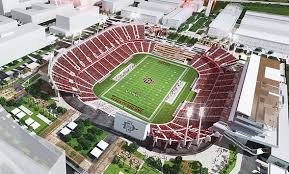Aztec Stadium
DAS and Wi-Fi infrastructure company Boingo Wireless has been selected by San Diego State University (SDSU) to design, build, operate and maintain a 5G-ready, neutral host cellular DAS network for the university?s new multi-use Aztec Stadium.
The venue is expected to be completed for the 2022 NCAA football season.
Aztec Stadium is part of a $3.5 billion SDSU campus expansion project in the Mission Valley neighborhood of San Diego. SDSU selected Boingo as the stadium?s DAS partner after a competitive review process.
Under the terms of the agreement, Boingo will deploy service throughout Aztec Stadium, including bowl seating, the playing field, concourses, entry gates, press box, locker rooms, media center, administrative offices and the surrounding parking lots.
Etihad Stadium
European wireless infrastructure provider Cellnex has deployed a Distributed Antenna System (DAS) at Manchester City?s Etihad Stadium.
The deployment of the new DAS will provide improved 4G mobile connectivity to the venue. Initially, the customers of U.K. carriers Vodafone and O2 will enjoy the enhanced connectivity at the venue. Cellnex said that additional operators are set to be connected in the future.
Cellnex noted that it has already made similar investments in large sporting complexes in Europe, including the Wanda Metropolitano Stadium in Madrid, the San Siro Stadium in Milan, Juventus? Stadium in Turin and the Olympic Stadium in Rome.
Mick Goulding, Head of Commercial at Cellnex UK, said: ?We are delighted to have partnered with Manchester City Football Club to provide this important connectivity solution for the Etihad Stadium. Fans will benefit from an efficient and high-quality signal to enable them to stay connected while they enjoy the quality football experience.?
Greg Swimer, CTO at City Football Group said: ?We are pleased to have worked with Cellnex Telecom for this project. This is part of a long-term plan for us to improve connectivity around the Etihad Campus. Cellnex has a track record in the installation, management and maintenance of mobile network communications. This project will allow all those that visit our stadium to benefit from reliable 4G, as well as the prospect of even faster 5G signal when it is available on their devices.?
Albertson Stadium
Boise State Athletics partnered with Verizon to install a new cellular distributed antenna system (DAS) that will be unveiled for the 2021 season.
The DAS will improve cellular coverage in and around Albertsons Stadium on game days.
?There is no detail too small as we evaluate the game day experience for Bronco Nation,? Director of Athletics Jeramiah Dickey said.? ?This new system opens the door for so many touch points ? from mobile ticketing to how our fans are able to share and access digital content from Albertsons Stadium while attending our games.
?As we prepare for capacity crowds, and as fans are looking to share their experiences and engage with other members of our fanbase, this will certainly be a noticeable difference to the fan experience,? Dickey added.
The new system, which includes the latest technology from Verizon and tripled the number of previously-available antennas, is designed to allow future adoption by additional carriers.
The DAS was slated to be unveiled for the 2020 season, but installation was postponed as a result of the COVID-19 pandemic.
?Right now we have 5G Ultra Wideband in 60 arenas and venues so people can experience ultra-fast wireless speeds, up to 4 Gbps in some places under ideal circumstances, giving them the potential to download and stream content in seconds, videoconference and collaborate on the go in near real time, and take advantage of new immersive customer experiences never before available wirelessly,? Brian Mecum, VP of device technology at Verizon, previously told In-Building Tech.

